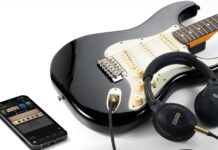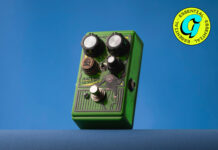
Sophie Lloyd says self-doubt led her to “almost quit guitar completely”
When your music career rockets as fast as Sophie Lloyd’s has, your inner critic can make you question if you really deserve to be where you are. That feeling is exactly what the 28-year-old shredder has tried to conquer on her debut solo record, Imposter Syndrome.
READ MORE: “We can scream and wail to show rage, and also create these beautiful harmonies that show solidarity and love”: HAWXX on the pure catharsis of metal
“This whole album is me making the conscious decision to overcome that, and work my way through it,” Lloyd explains. We’re speaking to Sophie from her UK home that’s not seen much of her over the last year or so – instead she’s been touring the world with rapper-cum-pop-punker Machine Gun Kelly, for whom she’s played guitar for since May 2022. In fact, just a few days before her chat Sophie put her album promo on hold to jet out to Brazil with MGK for his performance at the Formula 1 Grand Prix in São Paulo.
Lloyd clearly doesn’t mind a challenging schedule, and that’s clear from the scale of the ambition of Imposter Syndrome’s makeup. Each of its 11 tracks features a guest artist – from Steel Panther’s Michael Starr, to Trivium’s Matt Heafy, and even Lzzy Hale of Halestorm – this album was no easy feat to put out into the world.
“You don’t realise how much goes into it behind the scenes. 11 managers and labels, trying to get a release date that works for 11 different people, [it was] so difficult,” she laughs, a rack of her most cherished guitars – including her new Kiesel signature model – set behind her.
Sophie Lloyd and Trivium’s Matt Heafy. Image: Press
The “Cool Woman Rockstar Thing”
If you’re reading this, you may well have come across Sophie Lloyd online; she regularly shares “shred versions” of popular songs on social media, and her YouTube channel alone boasts over one million subscribers.
Tediously and inevitably, as her online presence grew and she continued playing across arenas globally with MGK, she became subjected to hateful comments and sexist rumours, and the worst kind of tabloid attention.
Despite any backlash she receives for how she presents herself, Lloyd owns her identity and has zero tolerance for letting hate from others permeate her thick skin: “I’ve always wanted to bring that feminine edge, because although I love rock and metal and mosh pits, I also love makeup and getting my nails done. I love the idea of combining all of that and branding that in itself – that kind of cool, woman rockstar thing. People on the internet will always get annoyed at it.”
Lloyd’s authenticity is a key part of who she is as a musician, she’s no shrinking violet. Extravagant on-stage hair flips and experimental alternative fashion are just a couple of elements to her exuberant persona as a performer. Even the colour purple has become synonymous with the Sophie Lloyd name.
She knows that misogyny plays a large part in why she has received hate. “For ages, men in the rock world have monetised women being sexy in music videos or on album covers. And that’s fine when men do it, but then as soon as a woman is like, ‘This makes me feel strong, this makes me feel powerful,’ suddenly, it’s ‘She’s a poser, she’s this, she’s that.’ It’s the double standards that irritate me.”
And she’s right – why can’t women embrace their sexuality, and be fucking brilliant guitarists at the same time? “Exactly!” she exclaims. “It’s not one or the other, you don’t need to fit into a category. You can do both.”
Sophie Lloyd. Image: Press
Owning The Tone
The May release of Lloyd’s Kiesel SL6 marked the first signature model from a female artist for the shred-focuses boutique brand. The guitar brought new upgrades to her previous Limited Artist Edition A6H Aries (which sold like hot cakes), with new features including a walnut neck, Sustainiac pickup, a kill switch, and options to customise fretboard materials, top woods and colours – a rarity for a signature.
“When I was a kid, all my excitement came from looking at guitars online and seeing all the crazy colours you could get,” she shares. “That’s such an exciting part of a guitar, building something that is an extension of your personality.”
Lloyd continues, “Not everyone wants to play a purple or pink guitar, I like giving people the freedom of choice so they can use it to express themselves. I think it’s cool that it has elements of ‘this is the Sophie sound,’ and ‘this is the Sophie Lloyd features, but it’s my version of it.’”
Back when she was just starting out, Lloyd found her love for “shreddy” guitars from playing a Mark Tremonti PRS model. She also played a Gibson Les Paul, which made her realise that she loved those classic, mahogany tones.
From there, she combined the metal aesthetic with warm yet lightweight black limba tonewood, and finally met her match: “My friend, Rob Caggiano [ex-Volbeat] recommended Kiesel. The guitars were just like nothing else I’d ever seen. I was like, ‘Oh my God. I want one, if not just to hang on my wall forever.’”
Lloyd’s pedalboard, however, is uber-streamline: “I don’t like too many different effects, just the amp tone, amp distortion, and then a bit of delay and reverb. If I want to mix it up maybe some chorus on the clean, but I’m not very exciting.”
When she tours with MGK, she uses a Kemper to keep her tones consistent. When playing at home, she uses Neural DSP’s Quad Cortex. She does have a “big ass” Diezel VH4 and 4×12 cabinet that she can break out in anger when needed, but the reality of living in an urban environment in 2023 means she tends to save that for studio work.
Sophie Lloyd. Image: Press
Winners Never Quit
Speaking of playing at home, we ask Lloyd for three tips for learning and practising away from the stage. Given that Lloyd has a first-class honours degree in Popular Music Performance, it would only seem fair that she shares some pearls of wisdom with us.
Firstly, find a scale you like and master it. If you’re hoping to be a shredder like Lloyd, she says that the minor pentatonic is “your best friend” and will “unlock a lot of the fretboard.” Secondly, all guitarists should try songwriting. She argues that even if that’s not the path you hope to go down, it will keep you inspired.
And finally, don’t lose motivation by only playing what you think you should be playing. Remember to spend time learning the songs that you love. And that brings us to an interesting anecdote…
“I almost quit guitar completely after my second year of music school, I was gonna drop it all and go do science instead,” she says nonchalantly. We can’t help but be stunned at how much of a drastic career change that would have been. “Such a 180 flip,” she admits. “Can you imagine me in a lab coat and glasses? The world would be in trouble.”
“I almost quit guitar completely after my second year of music school, I was gonna drop it all and go do science instead”
The reason why, she explains, is because she’d stopped playing the music she adored: “I came home one day and heard my roommate playing an Avenged Sevenfold song [Scream] and I realised I hadn’t played any music that I liked in about two years. I’d only played what I thought I should be playing to learn guitar, I’d only played scales up and down for two hours and a jazz piece I had to learn for school.”
Lloyd pretty much owes it all to that one Avenged track, and to that roommate for getting their practice in on that one fateful day. Just like she’s pulled herself out of imposter syndrome, she pulled herself out of that dry spell too – both through the power of music that she loves.
“That unlocked my love for playing again. That was the single reason why I didn’t quit. Although it’s good to learn all the other stuff, it’s so important to bring it back to what you’re good at.”
Imposter Syndrome is out now – find out more at Sophie Lloyd’s website
The post Sophie Lloyd says self-doubt led her to “almost quit guitar completely” appeared first on Guitar.com | All Things Guitar.
Source: www.guitar-bass.net











